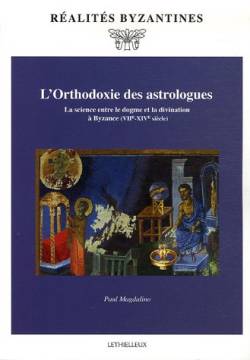
- Retrait gratuit dans votre magasin Club
- 7.000.000 titres dans notre catalogue
- Payer en toute sécurité
- Toujours un magasin près de chez vous
- Retrait gratuit dans votre magasin Club
- 7.000.0000 titres dans notre catalogue
- Payer en toute sécurité
- Toujours un magasin près de chez vous
L'orthodoxie des astrologues
la science entre le dogme et la divination à Byzance (VIIe-XIVe siècle)
Paul MagdalinoDescription
Réalités byzantines
La Byzance des moines et des icônes est une évidence qui cache trop souvent à nos yeux d'autres réalités tout aussi importantes, dont les techniques et les sciences, héritées de la tradition hellénique. L'astrologie en est une, que le présent livre décrit pour l'époque s'étendant du VIIe au XIVe siècle. Elle n'est pas alors une superstition banale, mais une méthode cherchant à relier les choses d'ici-bas à l'ordre céleste. Étroitement liée à l'astronomie, elle s'insérait à Byzance dans une cosmologie orthodoxe. Les astrologues byzantins tentèrent de concilier leur science avec la religion, affirmant qu'elle conduisait vers la connaissance de Dieu en recherchant la providence dans les mouvements des étoiles. Ce faisant, ils risquaient de réduire l'intervention divine à un système mécanique et ont provoqué la méfiance de l'Église orthodoxe, une méfiance accentuée par leurs emprunts à l'astrologie alors en plein essor dans le monde arabe. C'est de là surtout que les sciences mathématiques, dont l'astrologie, passèrent en Occident et semèrent le germe de la révolution scientifique. Byzance aurait peut-être contribué à cette révolution si elle avait reconnu l'orthodoxie de ses astrologues.
The image of Byzantium as a world of monks and icons tends to obscure the importance of other Byzantine realities, like technology and science, inherited from the Hellenic tradition. Among them was astrology, which this book traces from the 7th to the 14th century. During this period, it was not a trivial superstition, but a method aiming to relate world affairs to the heavenly order. It was closely linked to astronomy, and in Byzantium fitted easily into orthodox religious cosmology. Byzantine astrologers thus tried to reconcile their science with official religion, maintaining that it led to the knowledge of God by looking for divine Providence in the movements of the stars. But this threatened to reduce divine intervention to a mechanical system, and provoked the deep distrust of the Orthodox Church, all the more so since Byzantine astrology borrowed heavily from the flourishing scientific culture of the Arab world. It was, indeed, mainly from the Arabs that astrology along with the other mathematical sciences passed to the West, where they sowed the seed of the scientific revolution. Byzantium might also have contributed to this revolution if it had been prepared to recognise its astrologers as orthodox.
Spécifications
Parties prenantes
- Auteur(s) :
- Editeur:
Contenu
- Nombre de pages :
- 194
- Langue:
- Français
Caractéristiques
- EAN:
- 9782283604632
- Date de parution :
- 22-06-06
- Format:
- Livre broché
- Dimensions :
- 180 mm x 250 mm
- Poids :
- 400 g

Les avis
Nous publions uniquement les avis qui respectent les conditions requises. Consultez nos conditions pour les avis.






